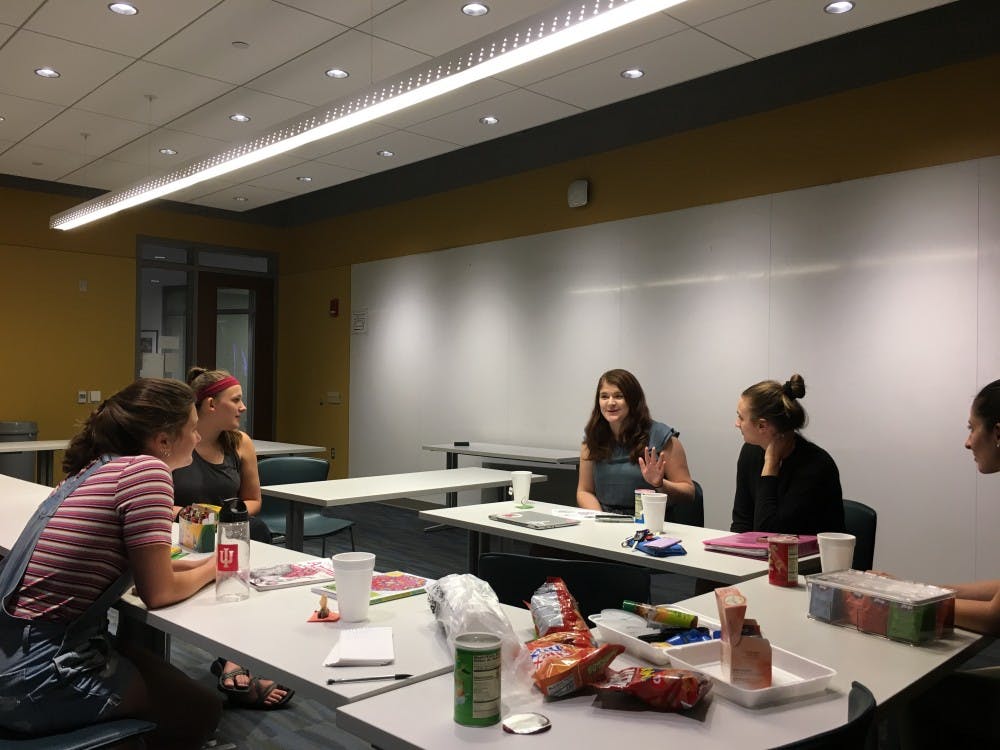Everyone needed a break.
Group members of Raising Awareness of Interactions in Sexual Encounters sat around tables Monday night coloring, drinking tea, eating cookies and discussing newly-appointed U.S. Supreme Court Justice Brett Kavanaugh’s recent confirmation. This meeting was centered on unwinding.
RAISE is made up of people who feel strongly about sexual assault issues, and many are survivors of sexual abuse or know someone affected by it.
RAISE has existed as an IU-affiliated sexual assault education group for more than 20 years, but it has evolved over its time on campus. It is currently a group of 10 to 15 students with loose ties to the Health Center’s Sexual Assault Crisis Service through their advisor and SACS counselor Ann Skirvin.
RAISE has similar goals as bigger, more prominent sexual assault awareness student groups and campaigns such as Culture of Care and It’s On Us. However, Ashlee Critser, director of events, and Maddie Neu, treasurer, said their organization has looser ties to IU than University-sponsored groups such as Culture of Care.
This allows RAISE to be more vocal against how IU handles sexual assault cases and to advocate for resource options outside the University.
“I think Culture of Care and It’s On Us have students that are doing great work but there is more University influence in the messaging which can be a positive thing but also bring restrictions as far as responses to certain issues on campus,” Critser said.
Even though RAISE is still connected with SACS, which is University-run, it is only connected through their advisor who doesn’t heavily influence their messaging.
Critser and Neu brought up the example of an IU student who was sexually assaulted and publicly complained earlier this year about IU’s process of investigating sexual assault cases and the resources available on campus for survivors.
“When Culture of Care made a statement, they made a statement including more IU resources which kind of ignored the issue at hand,” Critser said.
Critser said it’s important for students to be aware of IU resources but that it’s also important to be aware of other options.
RAISE’s statement in response to the student’s public complaints and accusations included resources for survivors that were more community and nationally based such as Middle Way House and the National Sexual Assault Telephone Hotline that were not University affiliated.
Critser said stories about allegations of sexual assault against Kavanaugh and three recent reports of rape in Bloomington, two of which were on IU’s campus, make it a stressful time for survivors.
“I know a lot of people are reliving experiences, whether it was something that happened to them directly or to someone close to them or just showing general empathy,” Critser said.
RAISE leads consent training for classes and student organizations, and Critser said one of the topics she likes to emphasize most is the importance of letting a survivor who confides in you make their own decision of whether to report the incident or not.
“It’s all about reclaiming the power that has been take away from them,” Critser said. “Sexual assault is a crime of power, and there is no wrong way to react.”
Looking to the future, Neu said RAISE has a big to-do list.
In order to be more inclusive, RAISE wants to be more intentional about their presentations being geared toward the LGBT community and male survivors. The group also wants to grow in membership.
RAISE’s overall goal for the future is to push IU to change how it deals with sexual assault reports and change how people react to national figures in the spotlight for sexual assault allegations.
As RAISE sipped their tea, Critser decided it would be appropriate to show the widely-known YouTube video “Tea and Consent” that compares giving tea to having sex.
“If you can understand how completely ludicrous it is to force people to have tea when they don’t want tea and you’re able to understand when people don’t want tea, then how hard is it when it comes to sex,” the video said. “Whether it’s a tea or sex, consent is everything.”




